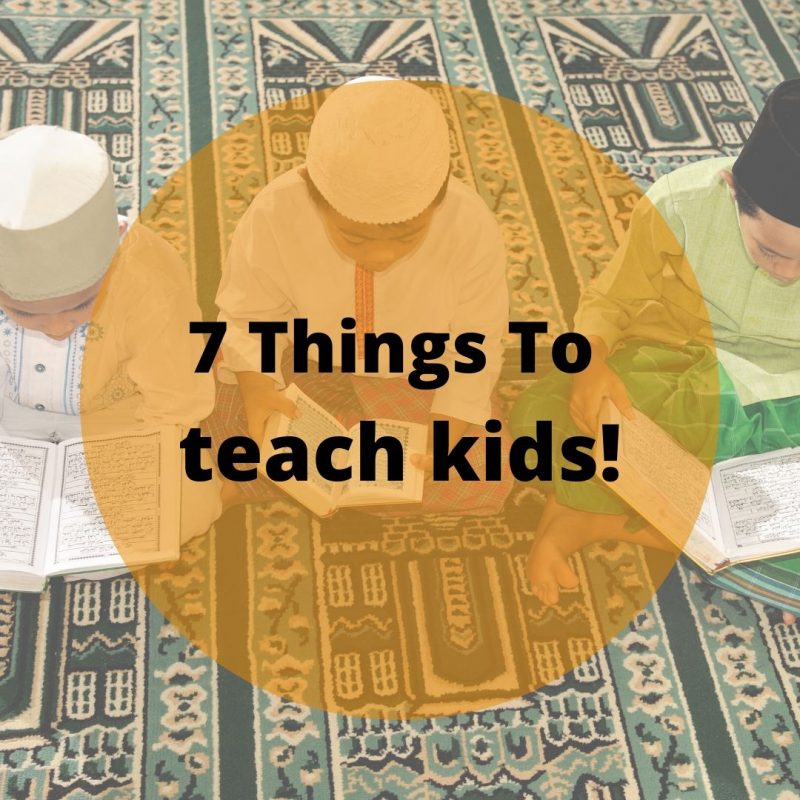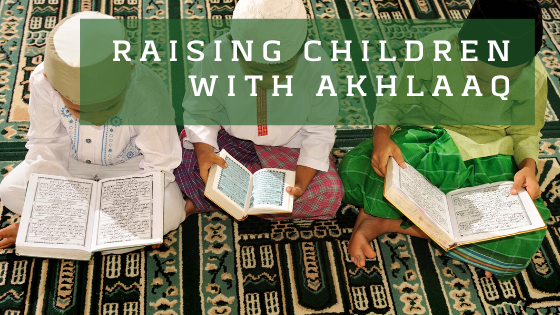The Hijab Diaries
Raising Children With Akhlaaq
It is very important to teach children about akhlaaq from a very young age. Islam considers children to be an Amanah from Allah جل جلاله, a responsibility which we have been entrusted with. One that we will be questioned about on the Day of Judgement.
Our children will be the legacy that we leave behind when we leave this world. They will be the bearers of the lessons we impart to them, the nurturing we have provided them with and the Islam which we have raised them with.
Teaching akhlaaq is one of the duties prescribed by Allah جل جلاله to a believer, in raising and educating children.
To help you we have included a free resource pack below for you to use with your kids to teach them about Akhlaaq, don’t forget to download & share it!
Contents
What should we be teaching our children?
I have only been sent to perfect good manners.
The most relevant answer to this question will be ‘adab and akhlaaq’ (manners and etiquette). We as parents don’t seem to emphasise these enough anymore. “Adab” can be defined as “the appropriate action, attitude, and response in any given situation”. “Adab beautifies everything it touches”.
We live in a multicultural society and it is becoming increasingly difficult to make our children understand what is right and what is wrong in terms of manners. Although all cultures across the world have similar morals, manners aka akhlaaq can differ from culture to culture.
As Muslims, we have teachings from the Quran and Sunnah that we follow. Simple lessons on gratitude or how to treat your neighbour, go a long way in making the world a better place for all of us.

So, how do we go about it?
Children imitate their parents more than anyone. Whenever we see undesirable behaviours or habits in our children, we have to check if we have ever acted similarly in front of them.
Preaching that lying is a sin and then lying in front of them will not help. Or asking them not to fight with their siblings and then having a row with the neighbour does not impart much faith. At the same time, it is important for parents to model the behaviour they wish their children to have. how you show your manners will lead to the type of akhlaaq your kids end up with.
A man came to the Messenger of Allah (saw) and said, “Direct me to a deed which will admit me to Jannah and take me away from the Fire”. The Messenger (saw) said: Worshi Allah and associate no partner with Him, perform Salah, pay Zakah, and maintain the ties of kinship. [Al Bukhari & Muslim, on the authority of Abu Ayyub Khalid bin Zaid al Ansari r.a]
Through the strict observance of these acts by parents, children will learn the importance and necessity of these actions early in their lives and will eagerly enforce themselves to start doing these acts.
The best among you are those who learn the Quran and teach it. [Al Bukhari narrated by Uthman r.a]
Watching the parent’s love and appreciation for the Quran will inshallah make them excited to spend time reciting, memorising and pondering over the verses of the Quran.
Part of perfecting of one’s Islam is his leaving that which does not concern him. [Tirmidhi, on the authority of Abu Hurairah r.a]
In the current times, where social media is a huge influence in our daily lives, it is especially important to hold on to this principle of leaving that which does not concern us. Both ourselves and our children should be regularly reminded that not applying this principle in our lives may lead us to several social ills like gossip, slander, jealousy, envy etc.
And We have enjoined upon man [care] for his parents. His mother carried him, [increasing her] in weakness upon weakness, and his weaning is in two years. Be grateful to Me and to your parents; to Me is the [final] destination. [Quran 31:14]
Setting rules and limits
It is the wish of every parent that their children are obedient towards them. But it should be a reminder to every parent also that they too must honour their own parents and treat them with the utmost love and respect.
Children understand and remember better by doing things rather than being taught to listen. When they are given a chance to experience something or interpret meanings themselves, they will remember the lessons for life.
Set rules and limits for everyone in your family, including yourself. Be sure to explain to your child why they must follow them, and make sure you try to follow them as well.
Children of the Ummah talk about the 6 C’s of akhlaaq: conscience, compassion, consideration, courage, control & confidence. The most interesting thing about this article is that it is written by a child so its perfect to share with your child for inspiration.
Being respectful and dutiful to parents

Often, we do not realise, but children watch how we behave with our parents. The first person from whom a child learns good manners is the father. If a child is raised in a home that follows good Islamic manners, then it would be natural for him to treat his parents respectfully. So if the father respects and values his own parents, these mannerisms will be adopted by the son or daughter as well.
Obedience to parents is so important in Islam but the most neglected in Muslim homes.
10 tips for parents
Follow these 10 tips to ensure success in this dunya (world) and the akhira (hereafter):
- Speak politely and respectfully to your parents, be kind to them, and never be rude to them, shout at them and show disgust. if you shout at your parents because of something that displeased you, don’t forget your child will behave the same with you tomorrow.
- Obey your parents as long as no disobedience to Allah is involved. Disobedience to parents is described as ingratitude and this is one of the major sins in Islam.
Your Lord has commanded that you should worship none but Him, and show kindness to your parents. Whether one or both of them reach old age while with you, say not to them (so much as), “uff,” and do not rebuke them, but always speak gently to them (Quran 17: 23).
- Guard their reputation and their property. Never take anything from them without permission, otherwise, your children pick up on the same habits. It’s important to teach your child to look after things and guard them.
- Help your parents when they need it. Your children will see you doing this and naturally follow your footsteps.
- Consult them in your own affairs even if you decide to go your own way. It makes them feel important and loved.
- Respond to them quickly and with a smile and when they call you, don’t sound irritated or frustrated. Parents, especially in old age get very disheartened and sad if they feel neglected. Not only is it a sin, but your children will do the same.
- . Try not to argue with them or speak to them with a loud voice – try to listen to them and if they are erring in their way, try to show them politely.
- Help your parents around the house, and offer help to wherever they need it. Even if you don’t live with them, it is really important to show good manners in this way.
- The most deserving of your kindness is your mother, then your father, and know that Jannah lies under the feet of mothers. However, a lot of people become engrossed in taking sides once married. If you are a wife and at odds with your mother in law, remember you don’t have to interact with her. However, it is important to ensure your husband fulfils his Islamic duties towards his parents. Seeing this, your children will learn to respect you and your husband more.
- Remember whatever good deeds you do or accomplish, your parents will benefit from it after their death.
Manners for children – 7 things you must teach!

- Teach children to use the right hand for eating, drinking, giving and taking. To eat and drink while sitting, and to stay, ‘Bismillah’ before eating and, ‘Alhamdulillah’ after finishing. Teach them to say Assalaamu Alaykum at home, in school, and in public.
- It is important to teach children hygienic etiquette, to clip fingernails and toenails, and to wash hands before and after eating.
- Teach them how to clean themselves after using the toilet and how to keep urine off their clothes.
- Correct their mistakes kindly and privately without scolding them.
- Assign each of them a separate bed, if possible, otherwise a separate cover. It is most preferable to have a room for girls and another for boys.
- Instruct children to keep streets tidy by not littering, to help neighbours if they need it – young children can do simple things like not make too much noise, or not hit their balls against the window!
- Warn against the bad company and against being rude to people if someone older advises them or tells them off for being in the wrong.
Don’t forget to download the free Akhlaaq resources pack where you get to teach your kids all about manners in a fun and interactive manner!
Here are some extra tips one can use:

- Communication: If you don’t teach them what is permissible and what isn’t, how will they know? We cannot just assume that they would learn on their own. As parents, we must sit down with our children and communicate these new responsibilities early on, without frightening or burdening our children.
- Practice makes perfect: It is not enough that we teach our children their manners once or twice and then expects them to carry them for life. Repetition, gentle reminders and following up to make sure that they are really understanding and implementing will ensure that they mind their teachings even behind our backs.
- Treats and rewards: Make sure you appreciate even their small achievements by rewarding them appropriately. Rewards will reinforce positive behaviour and will be an incentive to refrain from negative behaviour.
- Love and encouragement: When used right, words of encouragement can have a powerful effect on children. But as parents, we have to be careful that we praise the effort rather than the ability. When children are praised for the effort that they have expended in doing it, they will focus more on developing skills than on pursuing results.
Teaching gratitude

Gratitude is more than just saying “thank you.” Research has suggested that children who are grateful are happier, do better in school, and have lower rates of depression. Get in the habit of showing your gratitude for gifts, kindness, or wonderful moments and, If you start to do it, so will they!
Here is an idea for a game on gratitude:
Make an empty bracelet to put around your kid’s wrist, it can be a ribbon. Now over the month or even a week, every time the child does something to express gratitude, add a bead. Add a bead for each expression of gratitude she makes: and give bonus beads for certain actions. E.g. I am grateful to Allah for the food he provided could have 2 beads. You could have a prize starting from 5 to 15, with a different prize for a set number of beads. This would make it fun and make the child aim to get better at expression gratitude. You could go further and have siblings competing!
Why not get your kids the quiz gift set? compromising of a colourful book explaining akhlaaq to children in a fun way plus 2 sets of card that will give you hours of play!
How do I make time for this in my busy schedule?
There is nothing that kids love more than to sit with their mom and play! How many times has your child said play with me? but you have had time to do so. By playing with your children you can go onto teaching them about akhlaaq and Islam.
You will be able to instil the values you want your children to have, in a way that is fun and enjoyable to them if you spend quality time with them. Your children too will cherish these moments spent with you.
The parents are tools for shaping a child into a human being who is good or bad. The greatest gift that the parents can give their children is to teach them to be well mannered, kind, just, wise, righteous, faithful and loving towards fellow human beings.
So to make things easier for you we have created a bundle of activities that you can do together. Feel free to download our akhlaaq resource pack. Print it off and have fun together!
Download your Akhlaaq Resource Pack Here!


So happy to read your blog:) JazakaAllah!